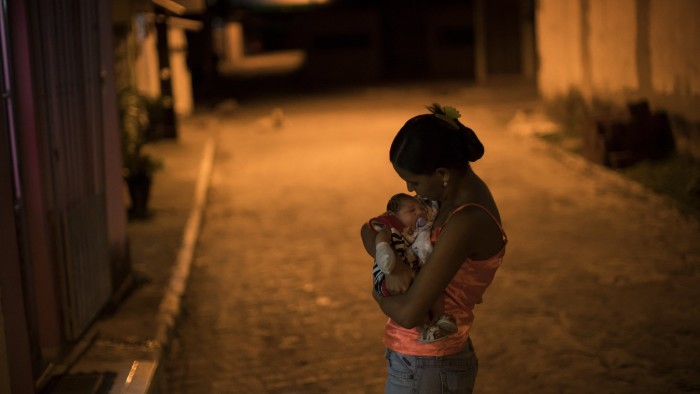UN risks Zika clash with Latin America leaders

Roula Khalaf, Editor of the FT, selects her favourite stories in this weekly newsletter.
The UN has called on governments in religiously conservative Latin America to liberalise access to contraception and abortion to help women cope with the Zika virus.
The comments, which are likely to anger the region’s strong Catholic and evangelical Christian communities, come as scientists in Brazil isolated the virus in saliva and urine of Zika patients and after authorities in Texas reported a suspected case of sexual transmission of the disease.
“Laws and policies that restrict access to sexual and reproductive health services in contravention of international standards must be repealed,” a statement from the UN High Commissioner for Human Rights, Zeid Ra’ad Al Hussein, said. These services included “contraception” and “abortion”, he said.
Latin America is the epicentre of the Zika outbreak, which was declared a global emergency by the WHO this week after an explosion in the number of cases of birth defects suspected to be linked to the disease, particularly in Brazil.
The mosquito-borne disease is sparking a debate in Latin America over the use of contraceptives and abortion. Countries such as Brazil have some of the toughest laws on abortion in the world thanks to a large evangelical faction in congress.
“There does not fall one leaf from a tree unless it is by the will of the Lord,” said Aurizia Macedo, an evangelical Christian in São Paulo, explaining why people must accept the consequences of Zika, no matter how terrible. “We do not have the right to take another’s life, I am completely against [abortion].”
Mr Al Hussein singled out for attack advice from Latin American governments that women simply delay pregnancies when the tools for doing so —— contraception and abortion —— were often not available. In El Salvador the government has advised women to postpone any plans for children until 2018.
“In Zika-affected countries that have restrictive laws governing women’s reproductive rights, the situation facing women and girls is particularly stark on a number of levels,” the UN Human Rights chief said.
“Comprehensive sexual and reproductive health services include contraception — including emergency contraception — maternal healthcare and safe abortion services to the full extent of the law.”
Zika is suspected to be linked to microcephaly in foetuses, a condition in which babies are born with an abnormally small head and sometimes an under-developed brain.
Carried by the same mosquito that transmits dengue, chikungunya and yellow fever, Zika was first noted in Africa in 1947 but its suspected link with microcephaly was only observed in 2007 in Polynesia and then in 2014 in South America.
More than 4,000 suspected cases of microcephaly have been reported in Brazil alone since October compared with only 150 cases reported in the whole of 2014.
Until recently, the disease was thought to be transmitted only by mosquito bite. But findings by Brazil’s Oswaldo Cruz Foundation released on Friday raised the prospect of it being transmitted by person-to-person contact through saliva or urine.
Scientists from the foundation said they had identified the virus in samples taken from two patients. It was deemed active with the potential to infect others, suggesting the need for further investigation to see if it could be spread through these channels, the foundation said in a statement.
The findings come after health authorities in Texas this week reported that a patient with Zika was infected after having sex with someone who had returned from Venezuela, where the disease is active.
The UN Human Rights Commissioner’s statement on abortion is likely to outrage evangelical politicians in Brazil, such as house speaker Eduardo Cunha, who is leading a bill to toughen further access to abortion in Latin America’s largest country.
In Brazil, abortions are allowed only in cases of rape, anencephaly —— when part of a foetus’s brain or skull is missing — or when the mother’s life is endangered.
Mr Cunha and the powerful evangelical block in Brazil’s congress are seeking to tighten the screening process for rape victims seeking abortions and to make it a crime to assist in an abortion.
Activists welcomed the UN’s comments but said it would be difficult to see a change in Brazil given the strong conservative element in congress.
“With or without the Zika virus, the liberalisation of abortion is necessary for the dignity of women,” said Ana Rita Souza Prata, the co-ordinator of a women’s rights defence group in São Paulo. “The Zika issue reinforces the lack of autonomy that women are facing.”
Comments